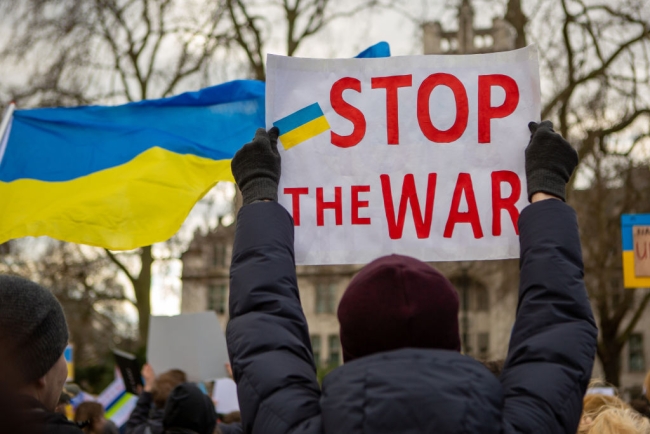You have /5 articles left.
Sign up for a free account or log in.

Protesters hold a placard and a Ukrainian flag during a demonstration against Russia’s invasion of Ukraine.
SOPA Images/Contributor/Getty Images
The Arizona Board of Regents announced Monday it would exit all investments in Russian assets, adding the three-university system to a small but growing list of institutions that have severed economic ties with Russia as the country continues its invasion of Ukraine.
The board “condemns in the strongest possible terms Vladimir Putin’s illegal invasion of the sovereign nation of Ukraine and apparent targeting of civilian populations, with one million refugees already in its wake,” Lyndel Manson, chair of the board, said in a statement. “With today’s action, the board repudiates Putin’s aggression and ensures Arizona’s public university enterprise divests of any Russian assets.”
The university system has about $4 million invested in Russian assets, which is just a small fraction of its $1.2 billion endowment, according to Fred DuVal, chair-elect of the board. Because of this, the move to divest is “meaningful, but not impactful,” DuVal said, and he encouraged other colleges, universities and pension funds to do the same.
“I recognize that many foundations are worried about their rate of returns for their pension funds, and I get that. But this is—as in our case—a very small fraction. It wouldn’t amount to a cup of Starbucks in most people’s portfolio,” DuVal said. “I just have to believe that every current and former faculty member is prepared to forfeit one thousandth of their pension funds in order to collectively create pressure on this regime that is seeking to end freedom in Europe.”
The Arizona board also plans to exclude Russian assets from its retirement fund and has instructed campus presidents to end or redirect academic program engagements with Russia.
Colleges and universities have used their investments to advance political goals in the past. In the late 1970s and 1980s, many higher education institutions responded to student and faculty calls to divest from South Africa in protest against the country’s system of apartheid. In recent years, a growing number of colleges and universities have divested their endowments from the fossil fuel industry.
DuVal said he was surprised that more colleges and universities haven’t already taken similar steps to divest from Russia.
“One thousand or 1,500 universities doing the same thing is hugely significant,” he said. “Where’s the call to arms?”
Few institutions are heavily invested in Russian assets, making divestment more symbolic than practical. The University of California, which boasts $164 billion in total assets, has “nearly zero” exposure to Russian assets, said Ryan King, a spokesperson for the system.
“This is largely due to our prior decision to sell our fossil fuel assets given the financial risks—and consequences to climate change—associated with that market,” King said in an email.
Still, the system “wholeheartedly supports the Governor’s call to restrict the flow of California’s capital to Russia in light of its invasion of Ukraine,” King said. “We join the millions of others throughout the world in condemning this brutal action, which has unfortunately cost lives, roiled global markets and devalued Russian assets.”
Governors in other states have also urged their higher education institutions to part ways with Russia. Colorado governor Jared Polis has called on state institutions to divest from Russian assets. Last week, the governor asked colleges and universities to completely divest their endowments of any Russian-owned assets, terminate all contracts with the Russian government and terminate grants for the Russian government and Russian higher education institutions.
“I know that we share our condemnation of Russia’s actions and will move together to ensure that Colorado’s dollars are not used to support the Russian government,” Polis said in a statement. “We will stand on the side of freedom and proudly support a democratic and independent Ukraine. War, violence, and chaos threaten the very foundations of the global economy and our national security. Colorado will not turn its head.”
In response, the University of Colorado is exiting its investments in Russian companies, which make up less than 0.1 percent of the university’s $2.6 billion long-term investment pool. The state research university also invests about $3.5 million in mutual funds with holdings in Russia, and it has requested that those funds exit the holdings “as early as allowable,” according to a university press release.
“Like so many others, we have watched in horror as this invasion has brought senseless violence and aggression to the region,” Todd Saliman, president of the University of Colorado, said in a statement. “We are looking for ways to show our support for the people of Ukraine and believe that cutting our investments is the right thing to do.”
In Virginia, Governor Glenn Youngkin asked colleges and universities to “divest in a prudent and orderly fashion any and all holdings of the Russian ruble and any and all securities of Russian companies.” Indiana governor Eric Holcomb has asked public universities to disclose research and funding ties to the country.
Spokespeople for Princeton University, Stanford University and the University of Texas system—three institutions with some of the largest endowments—did not respond to Inside Higher Ed’s request for comment. A spokesperson for Harvard University—which has the biggest endowment of any U.S. college or university, valued at nearly $52 billion—declined to comment in time for this article.
A Yale University spokesperson said in an email that “Russia has not been an area of interest for the Investments Office” and that the endowment has no manager relationships in Russia or who focus on Russia. Yale’s endowment, valued at $42.3 billion, is the third-largest endowment of any U.S. college or university.
It’s unclear how much money—if any—the top five endowments have invested in Russian assets.
DuVal ultimately hopes that the Arizona’s system board’s announcement will drive other institutions to part ways with Russia.
“We’re prepared to lead on this as others are and try to create a critical mass,” DuVal said. “If it’s just us, it’s the equivalent of wearing a blue-and-yellow lapel pin. It’s got virtue signaling value, but not much economic value.”








